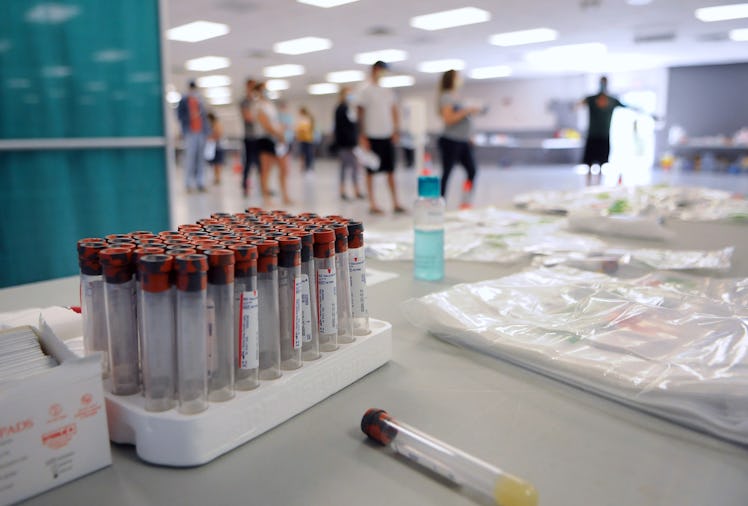
Here's What To Know About This Big Step To Reopening After Coronavirus
As the weather grows warmer, numerous states are exploring the possibility of slowly reopening amid calls for caution from public health experts. In light of the coronavirus' continued spread, experts have warned states not to open prematurely at the risk of generating a second wave of the virus. Given that as of May 12, a vaccine does not yet exist for the coronavirus, officials have cited antibody testing as a useful tool to shape reopening policy. But what is antibody testing? Here's what to know about this big step to reopening.
An antibody test, or a serosurvey, tests for the presence of antibodies that may combat an infectious disease. Rachael Piltch-Loeb, Ph.D, a preparedness fellow at the Harvard T.H. Chan School of Public Health, tells Elite Daily that you can think of antibodies using the analogy of "dusting for fingerprints after a robbery — the antibodies are the fingerprints the virus left." In New York City alone, roughly 25% of randomly testd residents tested positive for coronavirus antibodies as of April 28, per CBS New York, sparking an optimistic reaction from New York Gov. Andrew Cuomo. New York City Mayor Bill de Blasio announced on May 7, however, that the city specifically aimed to expand its antibody testing program to 140,000 residents starting the following week.
As Americans desperately seek a light at the end of the tunnel that is the coronavirus pandemic, antibody tests have increasingly been marketed as "immunity tests," which experts say is misleading. According to the Centers for Disease Control and Prevention, researchers still do not know for certain whether or not the presence of coronavirus antibodies will give you immunity from the coronavirus. At most, a positive antibody test suggests you may have previously had the coronavirus, but it does not yet provide any definitive answers about immunity, or protection from reinfection.
"The antibodies that are detected by a test, we don’t know whether those antibodies represent protection to us," Dr. John Swartzberg, an infectious disease specialist at UC Berkeley's School of Public Health, tells Elite Daily. "A mistake that people are making is to think, 'well, if I have a positive antibody test, I can’t get infected.' We can’t say that."
Swartzberg notes that many companies that are currently advertising antibody tests have misled the American public into thinking that a positive antibody test directly correlates with immunity. This poses an additional problem, Swartzberg says, because many of the antibody tests currently on the market are often inaccurate and have yielded false positives. After facing criticism for authorizing more than 100 coronavirus antibody tests for commercial use without vetting them, the Food and Drug Administration (FDA) announced on May 4 that it would assert more oversight over such tests moving forward. Given the uncertainty around antibody tests, Piltch-Loeb says that this type of testing on its own should not shape policy decisions.
"Tests have to be really good at accurately detecting the true positives (people who get a positive result and actually have antibodies) so that they do not provide a false sense of security to individuals (by giving a false positive result) and give a misperception to policymakers on a population level that more people in the population have antibodies than really do," Piltch-Loeb says. "Research is still being conducted to understand if having antibodies protects you from another infection and if so, for how long."
If an effective and accurate antibody test does become widely accessible, it could be used to assess how just how widespread the virus has been. Piltch-Loeb and Swartzberg both note that robust diagnostic testing, which tests for the presence of the virus itself, will also be required to shape reopening policies, as will contact tracing, which traces how many people an infected person has had contact with. Ultimately, both Piltch-Loeb and Swartzberg argue that Americans should not expect to return to any degree of normalcy until scientists develop an affordable coronavirus vaccine and an accessible treatment for the virus.
If you think you’re showing symptoms of coronavirus, which include fever, shortness of breath, and cough, call your doctor before going to get tested. If you’re anxious about the virus’s spread in your community, visit the CDC for up-to-date information and resources, or seek out mental health support. You can find all Elite Daily's coverage of coronavirus here.
Experts cited:
Rachael Piltch-Loeb, Ph.D, preparedness fellow at Harvard University's T.H. Chan School of Public Health
Dr. John Swartzberg, M.D., F.A.C.P., clinical professor emeritus at the UC Berkeley School of Public Health's Division of Infectious Diseases and Vaccinology